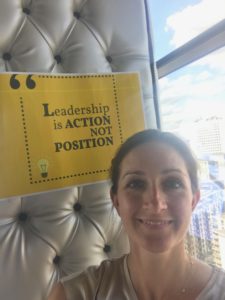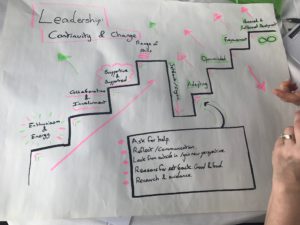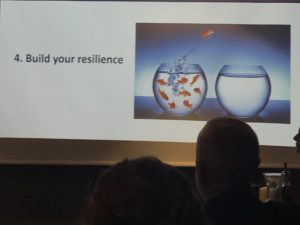At the beginning of July I was lucky enough to have been invited to be one of the #150Leaders, a new campaign run by The Council of Deans to develop and encourage healthcare students with leadership potential. I was excited to meet students across the entire sphere of healthcare professionals, and as we ate dainty pastries and sipped coffee from fine china cups, overlooking the Birmingham Skyline, I met student OTs, physios, mental health nurses and adult and children’s nurses, student midwives were also well represented.

We settled down into our seats around tables of ten and enjoyed an afternoon of presentations about what it means to be a leader, taking part in some exercises about a case study we were given: a nurse who had started out on her career path full of energy and vitality, had climbed the career ladder and had become a leader, but then felt she had run out steam and enthusiasm for the job – how could she tackle this? We were given gorgeous fat marker pens and a large piece of paper and we created a beautiful (courtesy of an artistic student physio) career progression chart.

A key attribute of a leader is to step back, take stock and re-adjust, seeking help when required. Just because you are a leader doesn’t mean you don’t need help, in fact you need more help and support than ever! It was inspiring listening to student’s and leader’s perspectives and stories and we all learned something new. My favourite part was the realisation that leaders are present in all aspects of the workforce, in and amongst each level of the hierarchy.
Resilience
We had a delicious evening meal and the highlight of the programme for me was meeting Ismalia De Sousa, an incredibly inspiring adult nurse specialising in stroke care, and an inspirational leader. The focus of her talk was on resilience, something that you need as a healthcare professional and also as a leader. Personal resilience has many facets including:
Confidence: recognise your strengths (and weaknesses!), challenge yourself and master skills, maintain your physical well being.
Social support: network effectively, distinguish between people being empathetic and sympathetic, use your support network (#SoMe, family, friends, colleagues)
Purposefulness: Strive for and achieve your goals, be aware and maintain your own personal moral compass, use positive mental time travel (where do I want to be in 1 year’s time?)
Adaptability: Mindfulness, resilient thinking, work smart (ask questions, ask for support, be efficient and a good time keeper)
I just love this slide that Ismalia used, sometimes you have to make the leap on your own, but it will be worth it!

The second day consisted of a wonderful breakfast with more networking, and some inspiring and honest talks by Dr Nigel Harrison and Adele Nightingale, learning about ‘bouncebackability’ and managing anxiety and burn-out with Yvonne Sawbridge. Being in a room with so many leaders has made me consider my own future, my passion lies with working with women, supporting and caring for them and their families through their pregnancy, birth and beyond. The #150Leaders programme has made me realise that leadership isn’t always about being a manager, but making the right decisions at the right times and most of all, working to the best of your ability and supporting and encouraging those around you to do the same.
Charlene Cole
